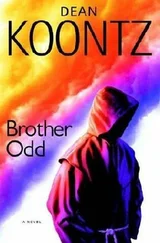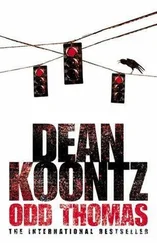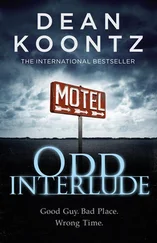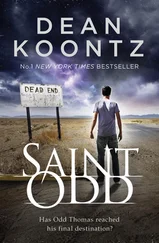Pure nitroglycerin is another matter.
I had separated the nukes from their triggers or from objects that I sincerely believed to be their triggers. At the time these events occurred, I was not a nuclear physicist-nor am I one now, as I write this-but I felt as certain as a nonphysicist could be that all four thermonuclear devices would ride out a hard jolt without vaporizing me.
The fog did not relent: nothing but fog, fog, fog.
I took a wide stance, leaning toward the console, feet pressed hard against the deck, and gripped the wheel tightly with my left hand.
The pong of the sonar counted a cadence grossly out of sync with the rhythm of “Ode to Joy,” and relying sheerly on intuition, I chose what I hoped might be the last best moment to punch the ENGINE STOP button.
I gripped the wheel now with both hands, holding course but mostly just holding tight.
A boat has no brakes. The only way to halt forward motion is to reverse engines. Switching off the engines, as I had done, at once kills further forward thrust but has no effect on current momentum.
We traveled the final meters of the Hecate’s Canyon channel with significant momentum. Water, of course, offers momentum-diminishing resistance, but less than you might think when the boat has a modest beam, a V-bow, and a round-bottom hull.
Only subsequent to these events did I learn about these aspects of the seagoing tug’s design, and come to appreciate fully how much it still has to give even after you kill its engines.
Sand offers greater resistance than water, as you might imagine, and mud outperforms sand in this regard. I cannot claim to have been able to discern when the tugboat finished ramming through sand and began beaching itself more firmly in mud. All I remember is that one second the channel was still deep enough to accommodate the boat’s draft, and the next second it was not deep enough.
The bullet-punctured bridge window shattered completely out of its frame, and every unsecured item aboard the boat flew as objects do in any building rocked by an earthquake. Nothing clobbered me, which spoke well to Utgard’s attention to maritime safety.
My legs went out from under me, but I held fast to the wheel.
Shrieking, twanging, cracking, popping, hissing, the tugboat climbed out of the waters of the cove-bow rising, rising-like a prehistoric amphibian deciding that the hour had come to declare itself sufficiently evolved for life on land.
When the craft came to a stop, I got my feet under myself, but for a long moment my cramped hands would not let go of the wheel.
ALTHOUGH I HAD STOPPED THE ENGINES BEFORE impact, I assumed a fire might still break out, even though diesel fuel does not burn as readily as gasoline.
The question about whether thermonuclear weapons might detonate from a hard knock had happily been answered in the negative. Fire, if it erupted, was not likely to faze the cast-steel jackets in which the shaped plutonium appeared to have been encased; therefore, I was not concerned about the release of radioactive material.
Finally able to let go of the helm, I retrieved the satchel containing the bomb triggers.
Earlier, when so much had remained to be done to convey the nukes to a place from which they could not easily be spirited away, I had been too frantic to notice how heavy the bag was. Handling the first of the triggers, I had estimated its weight at four or five pounds. That extrapolated to a maximum combined weight of twenty pounds, but the satchel was at least half again as heavy as that.
James Bond, especially as played by Daniel Craig, would have snatched up the satchel as if it contained politicians’ promises. Smiling insouciantly, he would have dashed off with the triggers at a pace qualifying him as a marathon runner in the Olympics.
Bond, of course, has the advantage of being fortified with a diet largely consisting of martinis. I drink nothing stronger than red wine, and not much of that.
Muttering something derogatory about bomb designers’ tendency to make everything bigger and heavier than it probably had to be, about their blithe disregard for the need to conserve precious resources, I carried the leather bag off the bridge. I closed the door behind me and held fast to it for a moment, getting my bearings.
The tugboat listed to port, and the deck sloped down toward the stern because the bow had climbed onto the beach. Although the wet deck had not been a serious challenge when we had been at sea, this degree of incline promised to provide me with entertainment.
Slipping, as they say, like a pig on ice, I crossed the canted deck to the railing and looked down. Wondering why a pig would ever be on ice, I saw dark ground under the eddying fog.
I hefted the satchel over the railing and let it drop. All the triggers were wrapped in double-walled felt bags, as if they had been purchased in an upscale store like Tiffany; consequently, they did not clank rudely upon impact.
Because the boat listed in this direction, I had to climb out onto the railing as well as scramble over it. When I landed beside the satchel, on solid ground, I promised myself that my seagoing days were over.
In the past, I had lied to myself about such things. For the moment, however, I was willing to disregard those previous false promises, perfidious as they might have been, and to take joy in my commitment to a landlubber’s life.
I considered heading directly inland, through Hecate’s Canyon, where coyotes prowled and where the buried bodies of at least two murdered girls-victims of the art teacher, Arliss Clerebold-had never been found.
Nope.
Instead, I picked up the satchel and, leaning to the right as though I remained on a listing deck, I stepped within sight of the breaking surf and followed it north, which was to my right as I faced the Pacific. In this white wilderness, the water line was the only reliable guide available to me.
According to the GPS sea map on the tugboat bridge, the cove had a crescent beach that curved between the steep slopes that formed the terminus of the canyon. At the northwest end of the cove, the beach continued north along the coast all the way past town to the harbor.
That turn, from cove to coastal shore, could be underwater at high tide. Fortunately, this was not high tide, and at a brisk walk I reached the main beach in two or three minutes.
A bluff diminished northward for the next quarter of a mile or more. I followed it until it petered out, and then headed inland until I came to Magic Beach’s quaint concrete boardwalk, on which I continued north.
I was tired. The events of the night justified my weariness. I felt that it would be within my rights to lie down for a nice sleep on the boardwalk, and to hell with the in-line skaters whose early-morning speedfest would be presented with one more obstacle in addition to the usual old men with canes and little old ladies with walkers.
Weariness alone did not explain my increasing difficulty with the leather satchel. Weary or not, the farther you carry any heavy burden, the heavier it seems, but neither did that truth solve the puzzle of the rapidly escalating weight. I had been lugging the bag for less than ten minutes, and already it felt twice as heavy as when I had dropped it over the tugboat railing.
With caution, I approached Hutch Hutchison’s house from the alleyway. Although I did not have to worry that Utgard Rolf might be waiting inside for me, and although I figured Hoss Shackett must be busy elsewhere, tearing his hair out and contemplating an extreme identity change that would include gender alteration, the pair of redheaded gunmen might have time on their hands and the patience to wait here like trap-door spiders.
Читать дальше
Конец ознакомительного отрывка
Купить книгу








![Dean Koontz - You Are Destined To Be Together Forever [an Odd Thomas short story]](/books/705298/dean-koontz-you-are-destined-to-be-together-foreve-thumb.webp)



